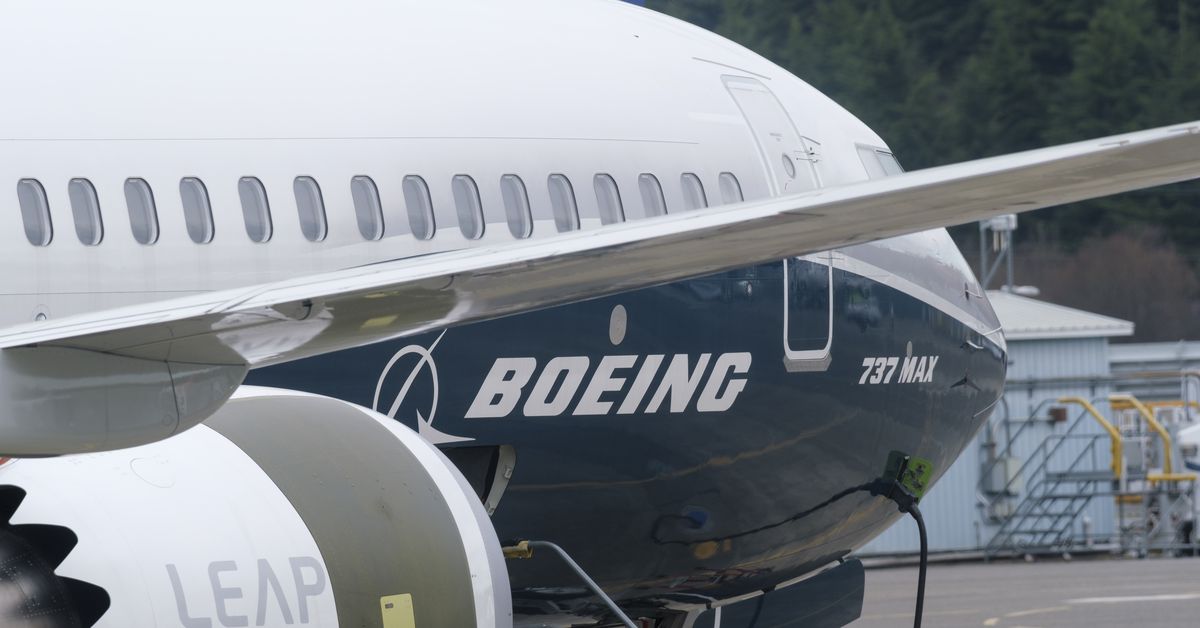
Boeing employees discussed the problems with the 737 Max in chats and emails that the company characterized as “completely unacceptable” in a statement released today. “Would you put your family on a Max simulator trained aircraft? I wouldn’t,” one employee said to another in one chat in February 2018, according to documents obtained by The Verge and originally reported by The New York Times. “No,” the other person replied.
“I still haven’t been forgiven by God for the covering up I did last year,” a Boeing employee said in a different 2018 conversation, according to the documents. The employee appears to be referring to interactions with the Federal Aviation Administration.
The redacted messages come from documents Boeing sent to Congress in December, which you can read in three collections here, here, and here. The messages show how Boeing tried to reduce the amount of simulator training required by the FAA to certify pilots for the 737 Max. These efforts ultimately left pilots unprepared to deal with the fatal flaw that brought down two 737 Max planes in five months, killing 346 people.
The communications “raise questions about Boeing’s interactions with the FAA in connection with the simulator qualification process,” Boeing said in its statement.
“The FAA reviewed the most recent 737 MAX-related documents submitted by Boeing for the purpose of identifying any safety implications,” the agency said in a statement to The Verge. “Our experts determined that nothing in the submission pointed to any safety risks that were not already identified as part of the ongoing review of proposed modifications to the aircraft.”
The chats and emails released by Boeing are “incredibly damning,” said Representative Peter DeFazio, a Democrat from Oregon who chairs the House Committee on Transportation and Infrastructure, in a statement. “Apologies from Boeing are not enough after these astonishing & appalling emails,” said Senator Richard Blumenthal, a Democrat from Connecticut, in a tweet. “Action & accountability are long overdue.”
The Boeing 737 Max was the most recent update to the 737, a plane that’s been flying for so long that entire airlines have built their businesses on it. Not having to retrain pilots from the 737 NG to move to the 737 Max was a particular selling point for the plane: classroom time and simulator time are expensive. The 737 Max’s development was particularly urgent, as Boeing’s main rival Airbus had developed the A320neo, which was considerably more fuel efficient than the Boeing 737 NG. But because Boeing rushed the 737 Max into service, pilots were not properly trained — or even made aware of — a piece of software that doomed the two fatal flights.
The newly released documents illustrate how forceful Boeing was in selling this idea internally, and to its customers. “I want to stress the importance of holding firm that there will not be any type of simulator training required to transition from NG to MAX,” the chief technical pilot of the 737 program, whose name is redacted, said in one 2017 email. “We’ll go face to face with any regulator who tries to make that a requirement.” If a customer wanted internal training, this employee wrote, that additional training “should be limited.”
One particular series of June 2017 emails between the chief technical pilot and an undisclosed airline show how aggressive the company was in trying to limit the amount of simulation work. “There is absolutely no reason to require your pilots to require a MAX simulator to begin flying the MAX,’ the chief technical pilot wrote to the airline. “Boeing does not understand what is to be gained by a 3 hour simulator session.”
The June 2017 emails show the chief technical pilot’s continued attempts to convince this airline that simulation training was not necessary. When the airline eventually relented, the chief technical pilot emailed another unnamed Boeing employee and said: “Looks like my jedi [sic] mind trick worked again! These are not the droids you’re looking for….”
“Haha, I’ll send you to negotiate piece [sic] in the Middle East next,” the Boeing employee responded. “Goes to show what a little bit a [sic] accurate info can do to sway an operator in the right direction…”
While Boeing’s effort to reduce the amount of simulation training was ultimately successful, not all employees were on board with the idea, according to the newly-disclosed documents. “Not sure if I will be returning in April given this – am not lying to the FAA. Will leave that to people who have no integrity,” one employee wrote in a chat to another in March 2018. “I’ll be shocked if the FAA passes this turd,” read another message between employees that May.
Just two days ago, Boeing reversed course and announced it will start recommending simulator training for the 737 Max in anticipation of the plane’s return to flight. Exactly when that return will happen remains unclear; the company indefinitely halted production of the plane in January, and the FAA has still not certified it to fly again.
Late last month, a senior Boeing executive reportedly told The Seattle Times that documents containing messages from the 737 Max’s senior technical pilot might continue to generate bad press for Boeing. Now we can see why.
https://www.theverge.com/2020/1/9/21059420/boeing-employees-messages-737-max-investigation-simulator-crash

